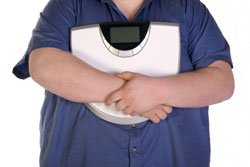Insulin Insensitivity: Is Insulin The Enemy?
What happens to insulin levels when you become overweight and what can you do about it?

Insulin insensitivity -- insulin resistance -- happens when you become overweight. You have too much insulin but your body can't use it.
On the one hand you need insulin to live. Without it you can't
That's what happens to diabetics if they get very sick. They have sugar in the blood but no sugar in the cells. So the cells of the body are starving.
So insulin is vital to life.
But on the other hand insulin stimulates fat storage.
That is because when insulin is released into the blood stream it makes you store fat. And when there is insulin in the blood it keeps you from breaking down fat.
Here's what often happens
If you are overweight and have a little bad luck (your genes have something to do with this) you can end up diabetic:- If you eat too much sugary food, too often, then you will have a lot of insulin in your blood.
- This excess insulin tends to trigger fat storage.
- In the presence of excess body fat insulin is less effective, so your body responds by making even more.
- The constant high levels of insulin then make it so that even when you are fasting, even when you are hungry, you will have a hard time breaking down fat to burn for energy.
- So you gradually become more overweight.
- And if you stay overweight your cells develop progressively worsening insulin insensitivity and eventually frank diabetes requiring pills or insulin injections.
You have insulin in your blood but your cells just won't take up the sugar.
Fix it while you can
First your blood sugar starts to drift up. After a while the elevated blood sugar damages your system and you get diabetes for real.
After that it is too late and even if you lose weight you are still diabetic. So you have to get this under control before that happens.
So insulin is the bad guy -- if you have too much of it.
Now, you don't want all this you happen to you.
The key is to regulate the amount of insulin your body makes and how it uses the insulin. You do this by what you eat and when you eat it.
And you do it by getting enough exercise to keep your blood flowing and your muscles healthy and your body burning up the fat.
A little bit about sugar
The simple carbohydrates are either one sugar molecule, for example:
- Glucose (blood sugar)
- Fructose (fruit sugar)
- Sucrose (table sugar) -- glucose and fructose
- Lactose (milk sugar) -- glucose and galactose
Notice that fructose is fruit sugar, but it is also part of table sugar -- the same kind of sugar that is in some soda, candy, cookies.
Too much fructose is not good for you. A lot of table sugar isn't healthy. But neither is a lot of fruit and fruit juice. Anyone with diabetes or obesity should eat very limited amount of sugary foods -- including fruit.
So what do you do?
Limit the simple carbohydrates.
These simple sugars are absorbed quickly, and that leads to trouble with insulin. So don't eat too many simple sugars.
So what do you do if you want to get control of insulin? The answer is pretty easy:
Cut out all the refined sugars -- the cookies, cakes, candy and sodas. Get your body weight as close as you can to your ideal weight. And make sure you are getting regular vigorous exercise.
You need some fiber
And also cut back on the natural simple sugars -- yes, even the natural ones -- and eat complex carbohydrates instead. These are the fibrous vegetables (like beans and cabbage) and the starchy vegetables (like yams and squash.)
Always take your carbohydrates with some protein so things are in balance.
And make sure you have plenty of fiber. Fiber is the tough part of vegetables. Humans cannot digest fiber. But it is good for you. It helps with your digestion--it keeps you from being constipated.
And it keeps you from having spikes in your blood sugar and that helps your weight and keeps you from developing insulin insensitivity.
If you do this you can get your insulin, and your weight, under control.
Popular articles:
With weight loss, knowledge is power...
If you know these few truths on this page -- and if you apply them consistently in your life...
If you can't stay on it forever and be fit and healthy and strong -- then it's an extreme diet.
Here's the easy way to ruin any slightest chance you have of losing weight...
Can you eat in restaurants and still respect yourself in the morning?
Calorie density is the difference between vegetable soup and a bagel.
Hidden calories that ruin your waistline...
Will it really help to drink water to lose weight?


